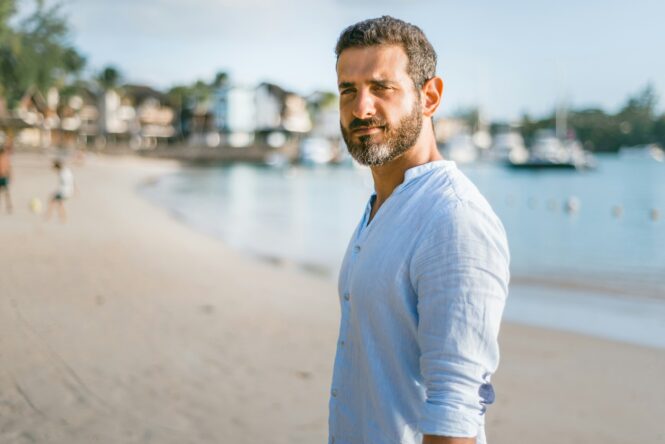Wisdom doesn’t always come with age or education, contrary to popular belief.

True sagacity has nothing to do with sounding clever or offering perfect advice. In truth, it shows in how someone carries themselves, sees the world, and responds when life gets complicated. Truly wise people have a calm, understated strength about them, shaped by reflection, lived experience, and emotional clarity. Here are some important personality traits that tend to show up in people whose wisdom runs deep.
1. They stop and think before they react.

Wise people don’t rush into heated arguments or decisions. They create space between stimulus and response—whether that’s taking a breath, asking a question, or simply choosing silence over impulsiveness. That pause isn’t passivity, it’s intentional. It’s the difference between reacting to be heard and responding to be understood. Their ability to hold space makes people feel safe around them, even in tense moments.
2. They’re comfortable saying, “I don’t know.”

Wisdom often shows up in humility. Truly wise people don’t fake certainty or bluff their way through conversations. They understand the value of admitting when something is beyond their knowledge. This trait builds trust. It signals confidence without ego, and it leaves room for growth. Ironically, the people who seem to “know everything” rarely do. The wise ones leave space to learn.
3. They stay grounded in tough moments.

When everything around them feels unstable, wise people tend to stay calm and rooted. They’ve likely faced enough hardship to know that panic rarely helps, and most storms eventually pass. This doesn’t mean they’re emotionless—it means they’ve developed a deep internal anchor. Their presence feels steady, and that calm often brings clarity to the people around them, too.
4. They ask questions more than they give answers.

Rather than jumping in with advice, wise people tend to ask questions that help other people find their own way forward. They’re more interested in helping you think clearly than in giving you “the right answer.” This makes their conversations feel respectful and empowering. They trust that people usually hold more wisdom within themselves than they realise—it just needs drawing out.
5. They reflect on their experiences regularly.

Wisdom doesn’t come from what you’ve been through—it comes from what you learn from it. Wise people tend to reflect deeply on their past, extracting meaning from both wins and regrets. They aren’t stuck in nostalgia or rumination—they’re actively learning from their own story. That self-awareness shapes how they move forward, and it’s part of what makes their advice feel so grounded.
6. They don’t need to be the centre of attention.

Wise people don’t need to dominate conversations or steer the spotlight their way. They’re often quietly observant, only stepping in when they feel they can offer something of value. They tend to listen more than they speak, and when they do speak, it’s usually worth hearing. Their confidence doesn’t come from being loud—it comes from being anchored.
7. They resist black-and-white thinking.

Life is rarely as simple as right or wrong, good or bad. Wise people understand nuance. They can hold two conflicting truths without needing to resolve the tension instantly. That mental flexibility makes them open-minded and compassionate, especially when dealing with people who see the world differently. They don’t need easy answers—they’re more interested in deeper understanding.
8. They’re guided by values, not ego.

Instead of acting based on pride or defensiveness, wise people make decisions based on internal values—things like integrity, kindness, fairness, and patience. Even when no one’s watching, they tend to choose what feels right over what feels easy or impressive. Their actions are rooted in something deeper than public perception.
9. They take responsibility for their part.

Wise people rarely play the blame game. They have the emotional maturity to recognise when they’ve contributed to a conflict or made a mistake, and they own it without shame or deflection. Their self-accountability makes their relationships stronger. It shows everyone that they’re safe to be real with, and that growth matters more to them than being right.
10. They protect their energy.

Rather than overexplaining themselves or getting dragged into drama, wise people quietly choose where they invest their time and energy. They know when to engage, and when to step back. This doesn’t make them cold or aloof. It just means they’ve learned the cost of trying to fix what isn’t theirs to carry. Their boundaries come from experience, not ego.
11. They stay curious.

Wise people aren’t afraid to admit they’re still learning. They’re curious about new perspectives, evolving ideas, and different ways of being—even when it challenges their own worldview. That openness is part of what keeps them growing. They don’t see learning as something you finish—they see it as a lifelong habit, and they’re always adding to what they know.
12. They practise emotional regulation, not emotional suppression.

Being wise doesn’t mean being emotionless. It means being aware of your emotions, understanding where they come from, and choosing how to respond to them. Wise people feel deeply, but they’ve learned how to sit with emotions rather than be ruled by them. That emotional discipline allows them to stay connected without losing control.
13. They know how to sit with discomfort.

Whether it’s grief, uncertainty, or an awkward silence, wise people don’t panic when things get uncomfortable. They’ve built tolerance for life’s messier moments, and they trust that discomfort won’t break them. This trait makes them dependable when things fall apart. They don’t need everything to feel good to stay present, and that presence can be a powerful source of support for other people.
14. They uplift without sugar-coating.

Wise people can be kind without being soft. They offer truth in a way that’s respectful but clear, even if it stings a little. You walk away feeling seen and stronger, not just soothed. That blend of compassion and honesty is rare, and it’s why their advice tends to stick. They care enough to tell you the hard thing, but never in a way that tears you down.
15. They aren’t obsessed with being wise.

Perhaps the biggest giveaway? Truly wise people don’t go around trying to prove it. They don’t position themselves as gurus or experts—they just live their values and let their presence speak for itself. Their wisdom isn’t a performance. It’s something quiet, lived, and rooted in experience. And it’s often only noticed in hindsight—after you’ve seen how they consistently choose calm, clarity, and care.




